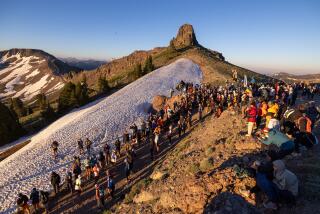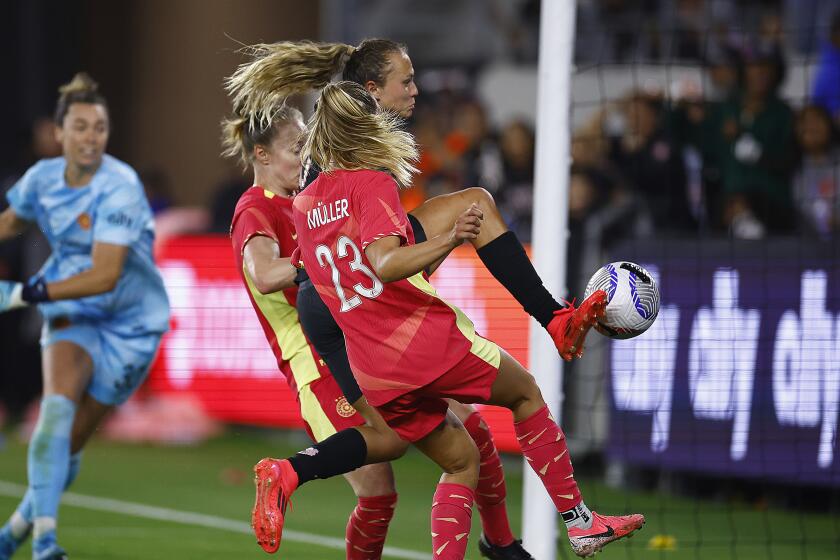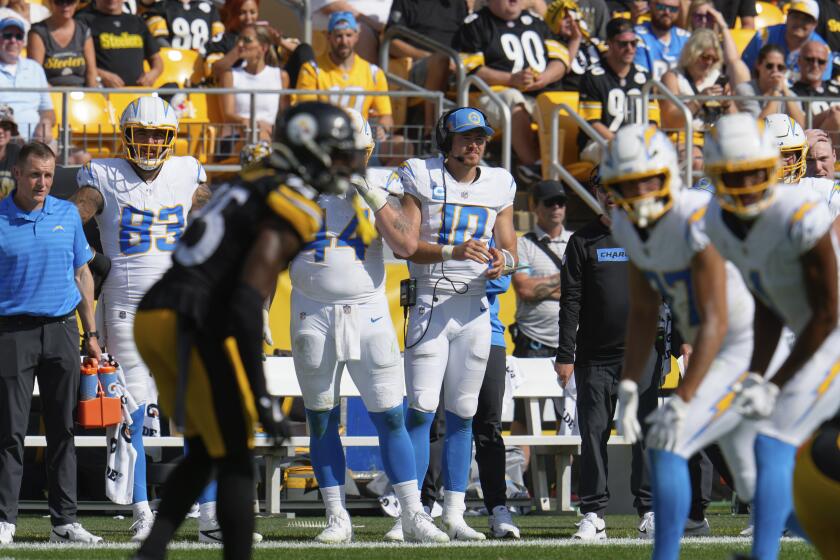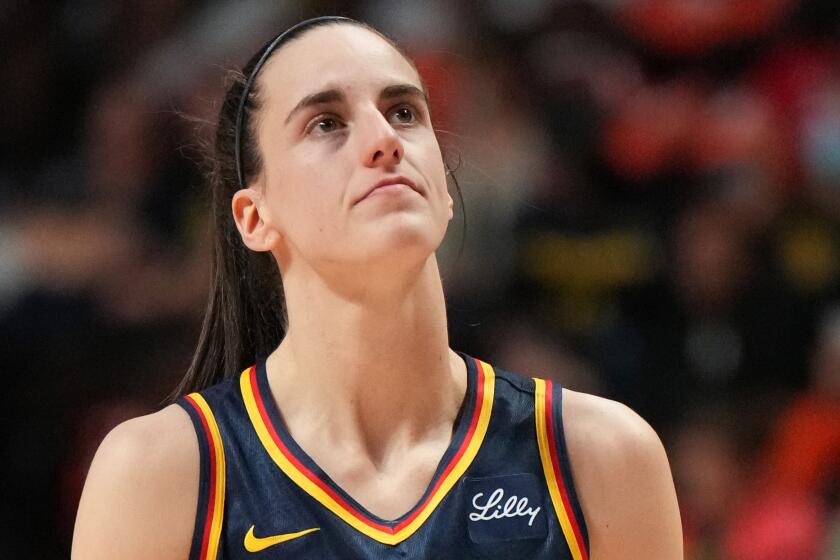For 6 L.A. runners, memory of Boston Marathon bombing is all too fresh

Three runners from the 2013 Boston Marathon talk about returning to the race a year later.
As the first bomb erupted on the sidewalk along Boylston Street at 2:49 p.m. last April, the concussion rippled through Phil Kent’s chemotherapy-weakened body.
Jennifer Hartman and Renee Opell dug their fingernails into his arms as they froze a half-block from finishing the Boston Marathon.
Finally within sight of the finish after almost four blister-filled hours, Kerri McKay thought a car had backfired or fireworks were set off.
A block and a half beyond the finish, Julie Hardin heard a noise like a sonic boom.
The windows shuddered in Max Esquivel’s hotel room.
The explosion these six Los Angeles-area runners took for a faulty gas line or passing construction equipment or terrorist attack on a nearby subway station instead spit BBs and carpenter nails into spectators clustered in front of Marathon Sports and LensCrafters. The orange flash became a dirty gray swirl of smoke that obscured the finish.
Twelve confused seconds passed.
A block down the street, the second pressure-cooker bomb left a mess of broken bodies and blood and shattered glass.
These six runners among the 23,326 who started that day had no idea the race wouldn’t end for them. Two crossed the finish line’s blue and yellow strip after the 26.2-mile journey. Four didn’t. For all of them, though, the bombs that stole three lives and injured more than 260 others turned the marathon into something more significant than a footrace. The bombs haunted and tugged and refused to let go of the runners over the last year. The race remained incomplete, in the runners’ minds or in the final steps they never took on Boylston Street.
The bombs live on for these six. For some, marathon finish lines now bring anxiety instead of joy. Others see that day reflected in a replacement medal made of construction paper or a photo that captured the moment of terror.
These six are drawn to marathons by the challenge to push their bodies beyond what they thought possible. They’re drawn by camaraderie and community and unity that’s more like that of a family or tribe.
Now, they’re returning to run in Monday’s marathon. They’re drawn by something bigger than themselves. They have no choice. They need to finish.
The warmup
Running made Kent feel better. Sure, treatment for pancreatic cancer diagnosed Dec. 10, 2012, transformed a mile loop around his Chatsworth neighborhood into a struggle to get his legs and arms to cooperate. Three months of chemotherapy stripped every hair from his body and delivered diarrhea, mouth sores, rashes, vomiting. Some days felt as if the cancer had knocked him down as a dark sky closed in.
The drugs shredded a body that had climbed mountains and completed almost three dozen marathons. The aerospace engineer forced himself to go outside and exercise when the side effects left him wanting to curl up into a ball.
“His doctor tried to slow him down and he didn’t want to slow down,” said Sharon Kent, his wife of 33 years.
Ten days remained until surgery to remove part of his pancreas that would require a 17-inch incision in his abdomen. Doctors didn’t know what awaited inside. But the 57-year-old Kent believed marathoners are different. They push. They drive. They go.
A monthlong break from chemotherapy helped. So did the determination not to pay heed to his oncologist’s concern. As Kent started the Boston Marathon on Main Street in Hopkinton, Mass., his lone compromise was to slow down to minimize the strain on his body.
A white baseball cap covered Kent’s bald head. He didn’t advertise the cancer, from the catheter implanted in his chest to facilitate chemotherapy to the focus on keeping his hands clean to avoid infection. Kent didn’t want to become the story or have people feel sorry for him.
Each mile took three or four minutes longer than normal. But Hartman and Opell, decade-long friends from the L.A. Leggers running club, knew the story. They planned to stick by his side.
The start
The six runners carried hope and doubt and a secret down the 130-foot drop over the marathon’s first mile.
A few days earlier, Opell, a project manager at a debit card company who lives in Studio City, thought she needed to give herself more credit for even competing here.
When McKay took up marathons in 2010, the Santa Monica clothing designer never expected to qualify for Boston. For her age group, that meant completing a qualifying race in 3 hours 40 minutes or less. McKay isn’t the sort who pounds out a marathon each week. The training saps the 39-year-old, mentally, emotionally, physically.
Esquivel, 48, hadn’t stopped chasing this feeling since he started distance running in 2005 to fulfill a promise to himself to run the L.A. Marathon before he turned 40. When the Pasadena small business owner crossed that finish line, he looked up at the skyscrapers and cried. He wanted to do this for the rest of his life.
Hartman once thought marathoners flat-out crazy. But she wanted to run Boston in memory of a close friend who fell 20 seconds short of qualifying before dying. And Hartman found herself promising a revelation to her friends 13 miles into the race. Approaching 48 years old, the Los Angeles financial advisor wanted to get pregnant.
Fourteen miles
The cool morning felt seamless to Hardin. Like a celebration. Fourteen miles in, kids bounced on trampolines as “Gangnam Style” blared. People lined the streets to cook out and drink and cheer as if each runner was the best they saw all day. The noise grew so intense that Hardin couldn’t talk with a friend while climbing Heartbreak Hill near Boston College.
When Hardin finished her first Boston Marathon in 2011, the Encino mother pinched herself. The accomplishment — she calls it a mini-Olympics for amateur runners — didn’t seem real.
“It’s one of the only opportunities as an adult you have to really feel free and unencumbered by all this stress,” the 51-year-old said. “As an adult, there are very few opportunities where you can earn a medal for something. It gives you that great joy of being a kid again. You can’t go and buy it. You have to earn it.”
Twenty-five miles
Near the Citgo sign that towers over the course 25 miles in, the trio paused for a photo. Ten seconds, maybe 15.
No one had cramped. No one had hit the wall. Even Kent needed only the occasional pouch of energy gel and cup of water to fuel his third Boston Marathon. Beauty, Hartman thought, filled the day.
Sharon Kent, no fan of the suffocating crowds closer to the finish, kissed her husband and snapped their picture. The runners draped their arms around each other. Opell is on the left, almost pulling Hartman and Kent toward the marathon’s final 1.2 miles.
Opell, 52, didn’t want to stop and chat. She had to finish.
“That’s the picture that kept us from crossing the finish line,” Opell said.
The bombs
As the three friends shrugged off fatigue in the marathon’s final block on Boylston Street, Hartman corralled them into position for a photo at the finish. They slowed. Kent had to be in the middle, Opell on one side, Hartman on the other.
They grabbed each other’s hands as they approached the Lenox Hotel. They survived together. Now, they planned to raise their arms in unison as they crossed the line for a perfect photo.
When the first bomb exploded in front of them, Hartman’s analytical side kicked in. She assumed people had died. She noted panic. She didn’t see blood. She wanted to protect her friends. The initial inclination to zip through the finish became determination to flee in the opposite direction.
For an instant, Opell, too, believed the friends should push through the bedlam and finish. Not even a minute’s jog separated them from the line. It’s right there, Opell thought.
Instead, they stopped in front of the hotel. No one knew what to do.
“I’m as fearless as they come,” Kent said. “But I felt the pressure in my lungs, felt it in my ears. It stopped me in my tracks.”
Hartman turned away from the finish as the second bomb hit behind them. Chunks of concrete showered onto spectators. She expected a third explosion any second. Finishing became irrelevant.
“I didn’t feel like we were safe anywhere,” Hartman said.
Fans streamed out of the bleachers along the street. Runners stood still or turned around. Bill Iffrig, the 78-year-old marathoner whose photo would be on the cover of Sports Illustrated, lay on the pavement 20 yards ahead. Police officers seemed to sprint in every direction. Behind the trio, one of those officers in a neon yellow vest told McKay to turn around and run as fast as she could. The journey here had taken much longer than she expected, thanks to a stop at a medical tent 15 miles in to treat blisters on both feet.
“Are you kidding me?” McKay remembered thinking. “I’ve just run all this way and now you’re telling me to run in the opposite direction?”
There wasn’t any choice. She could flee or be trampled by the confused mass of competitors and spectators trying to dodge danger no one seemed to understand.
“At that point, you’re almost delirious,” McKay said. “A bomb would be the last thing you think.”
In a nearby hotel, Esquivel watched Facebook messages congratulating the 48-year-old on finishing in a shade over three hours become urgent questions about his safety. Celebration whiplashed into sorrow.
A block and a half past the finish, Hardin felt the ground shudder twice in the mass of finished runners next to Trinity Church. Smoke rose in the distance. Adrenaline washed away any trace of the foggy “marathon brain” that usually greeted her after races. Hardin hadn’t even downed her usual post-race milkshake, but every detail seemed so clear. The sky. The streets. The crowd. She had to escape.
“When’s the next one going to happen?” Hardin said. “We have to leave. You feel it in your gut.”
The trio decided to escape, too. They ducked down a side street before the situation further deteriorated.
“I don’t know what I would’ve done if I had been alone,” Opell said. “That bonds us forever.”
Disappointment and shock and confusion over why someone wanted to ruin the marathon welled up in Opell. She cried as they left.
The aftermath
The race hasn’t ended for six of the tens of thousands of lives united by that day.
Kerri McKay’s voice broke as she recounted the post-marathon chaos.
“Sorry,” she said, “I still get emotional.”
McKay paused a moment until the tears passed.
“Walking . . . back to our hotel through Boston Common there was military there, things were blocked off,” she said. “That’s when I finally thought, ‘Oh, my god. This is really what happened. People came to an event where everyone’s happy and cheering on everyone and then tried to kill people.’ And for what?”
McKay hasn’t run a full marathon since the bombs. The finish lines at a couple of half-marathons, though, looked different. They brought back that day. This will be McKay’s last marathon for the foreseeable future, with marriage and, hopefully, pregnancy beckoning later this year. Defiance creeps into her words as she talks about the bombs ending the chance to complete something she worked so hard for. She remembers the fear and trauma and tears, but, most of all, the kindness of strangers lingers in her mind.
Max Esquivel doesn’t feel right wearing his marathon T-shirt because of the memories woven in. He’s still trying to understand what happened. The return, Esquivel believes, will prove that a couple of bombs can’t stop marathoners. He expects a “beautiful, beautiful experience.”
For Julie Hardin, post-race crowds after big events create stress and anxiety. She worries about other runners, worries about spectators, worries about herself. Barricades at the end of February’s San Francisco Half-Marathon left her feeling as if there wasn’t any escape. But her resolve to return to Boston never flagged. Less than 24 hours after the bombing, she knew she had to run there again. Hardin never thought of herself as the sort who’d react to tragedy with such boldness. But she doesn’t want the bombers to win. She wants to reclaim the day from them.
Jennifer Hartman’s first child is due Oct. 3. The bombs changed her plan not to run Boston this year. She’ll jog 18 or so miles and walk the rest. She wants to finish. Even with a photo that captured the moment when the second bomb exploded behind the trio, it’s difficult for her to believe that, yes, they stood in the middle of the madness.
Two days before Thanksgiving, Phil Kent finished chemotherapy and, in February, doctors declared the cancer in remission. Still, he struggles with the 12 seconds between bombs. Had he been alone, he’d have dashed over the finish line. Maybe he could’ve helped carry the injured to the medical tent.
“I’ve thought about it over and over again,” Kent said.
Sudden noises bother Renee Opell. Like the first time she watched television coverage of the attack and heard explosions she knew were coming. Like the men dressed as pirates shooting toy guns at each other as she ran the Portland Marathon in October.
That day in Boston lives in smaller gestures. In the hours after the bombing, Hartman made Opell a medal. The circle of yellow paper hangs from a yellow shoelace.
“I ran 26.1 miles in Boston 2013,” the inscription in black marker reads.
Opell’s voice carries an edge when she talks about finishing. Not if or maybe. But when.
More to Read
Go beyond the scoreboard
Get the latest on L.A.'s teams in the daily Sports Report newsletter.
You may occasionally receive promotional content from the Los Angeles Times.











